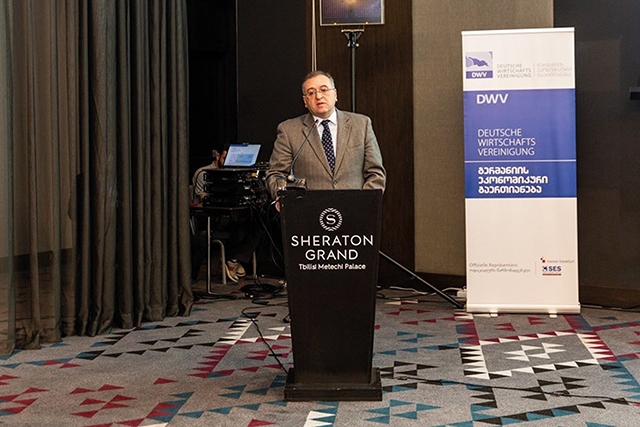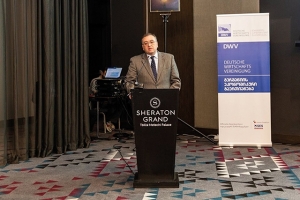German Embassy & the National Bank of Georgia Meet to Discuss the Georgian Currency
On February 6, at the Sheraton Grand Hotel, the German Embassy alongside the National Bank of Georgia, in the framework of the DWV (Deutsche Wirtschaftsvereinigung) business forum, held a presentation about the Georgian currency and the obligations of the National Bank.
The official title of the presentation was ‘Monetary Policy Development and Recent Challenges of the National Bank of Georgia’.
The event was opened by Mr. Thomas Kimmeswenger, the Executive Director of the DWV, the German Business Association. He spoke about Georgia’s hospitable environment in doing business, as well as the challenges and trials faced by the private sector. He also introduced the framework of the project and talked about the context of the business forum, from which this get-together was made possible.
The stage was then given to the German Ambassador to Georgia, Mr. Hubert Knirsch, who spoke about imperative and actual economic and political conditions in the country. Mr. Knirsch gave a short overview of the fiscal and monetary situation and furthermore underscored the activities and the achievements which have been made during his time in office.
Mr. Koba Gvenetadze, the President of the National Bank of Georgia, then gave an in-depth presentation about Georgia’s unstable currency and the problems that it faces in the global market. One of the main themes of discussion was the problem of dollarization and how it deteriorates already unstable and weak currencies.
In the first part of the presentation, the head of the National Bank talked about the history of the Georgian currency, how it has transformed throughout the years with high inflation and immense outside influences. The second part of the presentation was about the external and internal factors which worked to either strengthen or deteriorate the National currency. The second part was also conceded to interesting economic indicators of 2019 and the exchange rate issues.
“If we look at Georgia’s economy in a pie chart, the biggest sector is the services sector with 69%, Manufacturing 14%, Construction 8%, Agriculture 8% - although we have more than 50% of the workforce occupied in agriculture, this indicates that this segment has much bigger potential which has to exploited wisely,” Mr. Gvenetadze said.
In an important macro-economic outline of Georgia’s economy, one of the biggest challenges Georgia faced after the fall of the USSR is the large current account deficit. In 1992, when the Soviet Union officially ceased to exist, Georgia’s inflation rate skyrocketed to 15000%, which was the biggest among former USSR countries. When the Central Bank of Russia rejected the plea to aid Georgia, Coupons were introduced. A couple of years later, the Georgian Lari was introduced to the public. Georgian Lari or GEL decreased the inflation rate substantially over time, and the Georgian economists call the time after 1995 the ‘stabilization’ period.
In today’s world, which is based on commerce and the development of trade, this negative balance is the cause of the unstable economic environment in Georgia. According to the President of the National Bank, it is important to stabilize this factor.
“For three consecutive years, the current account deficit has been decreasing and at present, it has reduced by about 13%,” Mr. Gvenetadze noted.
Georgia follows the examples of New Zealand and Canada in purposely targeting inflation. Mr. Gvenetadze stressed at the forum that before any of the above national banks were applying this, German Bundesbank had been practicing it since the 1990s.
Mr. Gvenetadze concluded his presentation with the achievements in which Georgia can take satisfaction.
“When experts discuss developments in the economic sector, they always mention Georgia’s economic stability, progression in different economic fields, independence of the National Bank, the exchange rate, the monetary policies, fiscal stability and the increasing of the National Reserve funds,” Mr. Gvenetadze said.
By Beka Alexishvili











